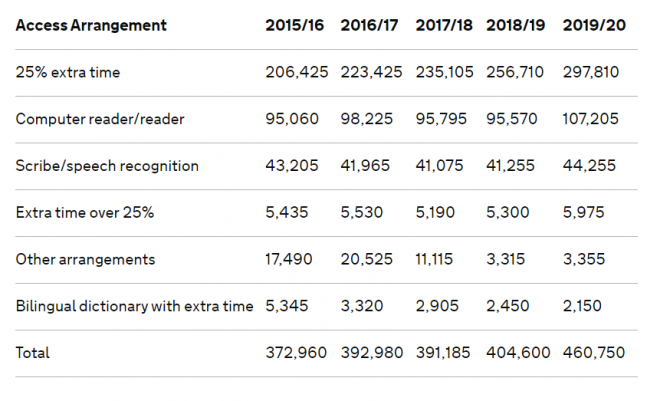Hundreds of thousands of pupils could face “unfair” exams grading this summer if their accessibility needs are not properly taken into account, disability organisations have warned.
The National Deaf Children’s Society, Royal National Institute of Blind People, the Professional Association of the Vision Impairment Education Workforce and the British Association of Teachers of the Deaf are concerned over plans to use teaching assessments to replace formal exams.
It’s completely unfair to give any student potentially life-changing grades based on situations they couldn’t access
They fear at least 300,000 students with special educational needs, disabilities or temporary injuries could be disadvantaged if they are graded on work such as mocks or classroom work that were completed without the access arrangements they would usually get in exams.
Government statistics show 297,819 pupils were granted 25 per cent extra time last year before exams were cancelled, while 107,205 were to be given the use of a reader or computer reader and 44,255 were approved to use a scribe or speech recognition.
The groups warned the system this year could hit some pupils with “decades of disadvantage” if their needs are not accounted-for.
The Department for Education and Ofqual will announce final plans for the summer qualifications next week, after cancelling GCSEs and A-level exams due to the Covid-19 pandemic and partial school closures.
One of the government’s proposals is that teachers could use papers set by exam boards to help inform students’ grades, as part of a breadth of evidence. In their consultation, they also asked for views on whether work done earlier in the year should be taken into account.
‘300k students could face unfair grades’
Martin McLean, NDCS’s education policy advisor, said it was “completely unfair to give any student potentially life-changing grades based on situations they couldn’t access”.
“Yet without strong and decisive action, this is exactly what will happen and it could mean 300,000 of them are graded unfairly.”
He said exams regulator Ofqual “has the evidence and expert opinions it needs to stop this happening, but it must provide a clear and decisive plan to make exam centres and awarding bodies clear on the way forward”.

In the equality impact assessment published alongside the exams consultation, Ofqual and the DfE said disabled students “would have to be given” reasonable adjustments when taking “any assessment” for grade evidence.
It adds that it does not consider this would be “problematic, at least not if the assessments were undertaken within the school or college”.
“The student’s school or college would know how the student normally works and make any such adjustments as were necessary to reflect the student’s normal way of working,” they said.
But if the assessments have to be taken elsewhere, such as at home, while extra time or larger fonts could be easier to sort, other adjustments such as dictating to a scribe or the use of specialist equipment “could be more difficult”.
‘Robust guidance’ needed
Tom Middlehurst, curriculum and inspection specialist at headteachers’ union ASCL, said the disability organisations raised “really important, valid” concerns.
He urged Ofqual and exam boards to offer robust guidance and rigorous quality assurance checks to ensure students are not disadvantaged by the process.

“This is a serious issue and there is no room for corners to be cut but students will be able to take some reassurance from the fact assessments will be carried out by their teachers, who have first-hand experience and knowledge of the issues they have faced.”
Students should get extra grounds to appeal
The group of organisations also recommends that students should be able to appeal if they believe they have been disadvantaged by the choice of evidence, or if advice from specialists was not sought.
McLean said: “Unfortunately, you can’t always rely on adjustments being put in place by every teacher each time they carry out a form of assessment, particularly if that assessment was never originally meant to have contributed to grading.”
He added that “without exactly the right approach there could still be a big different between theory and practice”, adding the stakes were “extremely high”.
An Ofqual spokesperson said they “absolutely recognise and understand” the issues raised, and would say more next week.
They said that last year, schools were asked to make judgments assuming students with special educational needs and disabilities (SEND) had continued to receive any usual additional learning support.
“We also suggested that teachers should approach other educational professionals, who had worked closely with their SEND students, to see if they were able to provide further information that could be considered when determining a centre assessment grade.”
The DfE said fairness to young people “has been and will continue to be fundamental to every decision we take on these issues”.








Your thoughts